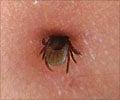Frequently Asked Questions
1. Which doctor should I consult for Lyme disease?You should consult a general physician or an internist for early stage Lyme disease. If the disease has progressed, an infectious disease physician should be consulted.
2. How does Lyme disease set in?
Lyme disease occurs as a result of tick bite. Symptoms may last from 2-30 days. In some cases the bacteria can go through a period of incubation before the symptoms start showing up.
3. Will there be other diseases accompanying Lyme disease?
Ticks are vectors of other diseases too and these may also be passed on to the individual.
4. Does the disease affect the mental faculties?
If the bacteria reach the nervous system then there is a likelihood that the mental cognition is affected.
5. What is Lyme carditis?
When the Lyme disease causing bacteria enter the tissues of the heart, it is called Lyme carditis. Symptoms include heart palpitations, chest pain or something called a heart block that occurs if there is a disturbance in the beating of the heart.
6. What should you do if you are diagnosed with Lyme disease when you are pregnant?
Lyme disease contracted during pregnancy should be treated to prevent infection to the placenta and possible stillbirth. There are no serious effects on the fetus when the mother takes antibiotics that are safe to consume during pregnancy. Additionally, there are no reports that Lyme disease can be transmitted through breastfeeding.
7. My blood tests still test positive for Lyme disease even after my antibiotic course. Do I still have the disease?
Your immune system is going to continue making antibodies against the bacterium for months or sometimes years after you were infected. That’s why the tests still show positive results. This does not mean you have the disease now.
8. Can I contract Lyme disease for the second time?
Unfortunately, it is a possibility as the antibodies in your bloodstream do not prevent you from getting the disease again when bit by another infected tick.
9. How do you remove a tick from under your skin?
Use a fine-tipped pair of tweezers and grab the tick close to its mouth and pull it straight out without twisting it until it lets go off your skin.
10. How do you dispose of a live tick?
A live tick can be disposed by submerging in alcohol, putting it in a sealed bag, wrapping it tightly with tape or flushing it down the toilet.









